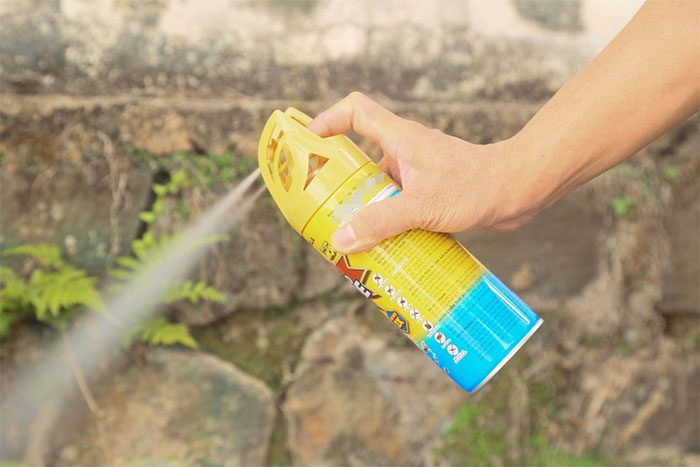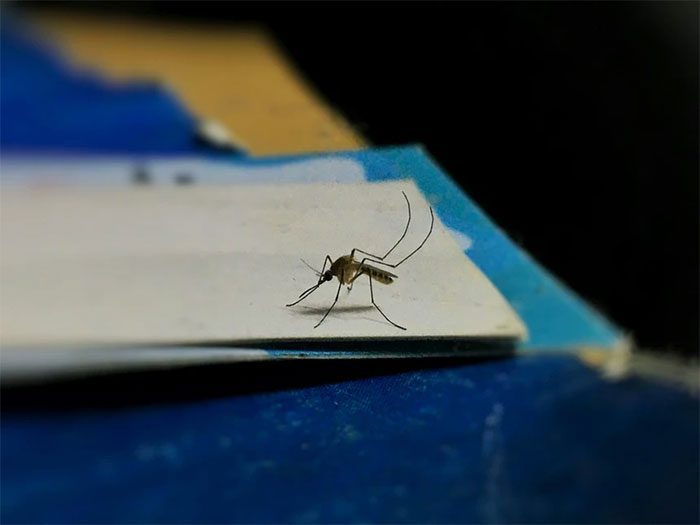The method of exterminating insects with chemicals is not long-lasting and may have side effects if not implemented correctly.
Key Principles of Mosquito Control
Dr. Tran Kim Long, Deputy Head of the Infectious Disease Prevention Department at the Dak Lak Provincial Center for Disease Control, stated that the first principle of mosquito control is to eliminate all larvae; do not allow water to accumulate in jars, vases, or plant pots.

Using insecticides from reputable sources and in the correct dosage helps protect the environment and human health. (Photo: Bao Trong).
Plant pots in many households that have not had their water changed for a long time can also be suitable breeding grounds for mosquitoes.
If there are ponds or ditches around the house, individuals should use larvicides such as Han Tephos or Abate and sprinkle them in water areas once a week.
Families with large gardens can control mosquitoes by spraying medical alcohol at the base of trees. If there are many drainage ditches around the house, people can pour kerosene on the surface of the water in the ditches to prevent mosquitoes from laying eggs.
“People need to be aware that the quicker the insecticide kills, the stronger the chemical concentration in the product. Therefore, not only do insects die, but humans are also affected. Those who inhale or come into direct contact with these chemicals face significant health risks. This does not even account for the danger of using unlicensed or counterfeit products, which is even more hazardous,” Dr. Long shared.
The market offers a variety of biological products for mosquito and pest control. Common products among many households today include spray bottles and mosquito coils. Additionally, there are liquid or powder formulations that can be mixed with water for broader spraying, or essential oils marketed as repellents.
However, the insecticide market is filled with both real and fake products. Without proper knowledge or by opting for cheaper options, individuals can easily purchase harmful chemicals disguised as “mosquito repellents,” essential oils for room disinfection, or pest control products…
Misunderstandings About Mosquito Insecticides
For many years, the World Health Organization (WHO) and the Ministry of Health have enforced strict regulations regarding the spraying of insecticides. However, the current market is flooded with various chemicals available for sale, allowing people to buy and spray them independently, making it difficult to control the level of danger.
Using chemicals indiscriminately, in incorrect dosages, for prolonged periods can lead to insects developing resistance, while humans may suffer from poisoning.

Mosquitoes may develop resistance if sprayed incorrectly. (Illustrative image: Unsplash).
In the dengue fever prevention program, the slogan “no larvae, no dengue” is always emphasized. This highlights that eliminating larvae is the “root” of the dengue prevention process.
Mosquitoes typically do not rest on walls but rather on clothing, especially worn clothing. Meanwhile, the spraying process targets walls.
After spraying mosquito insecticide, if there are still larvae present in the household, they can develop into mosquitoes within 1-2 hours and restart the cycle of attacking humans. This is why spraying mosquito insecticides is often ineffective in preventing dengue fever.
Moreover, spraying insecticides usually occurs only during an outbreak. However, the use of ultra-fine mist, primarily meant to kill dengue mosquitoes, is only a temporary solution, effective for 1-2 hours.
Additionally, according to Dr. Long, individuals self-purchasing insecticides may not only find them ineffective but also increase mosquitoes’ resistance. Furthermore, when hiring pest control services, people should verify whether the chemicals are recommended for use by the WHO and the Ministry of Health in dengue prevention programs.
“The best and most effective way to prevent dengue is to regularly check for breeding sites around the house. If mosquitoes are spotted indoors, individuals can use electric mosquito swatters to eliminate them. Additionally, wearing long clothing, using socks, and sleeping under mosquito nets are the best measures to prevent dengue. Personally, I do not recommend that people spray mosquito insecticides, as this is not a sustainable method,” Dr. Long noted.


















































